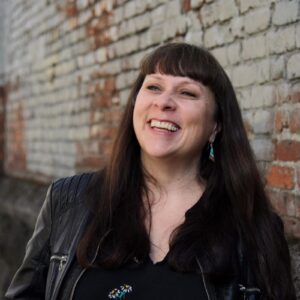
Green Workforce Academy Program Manager
Photo credit: Noel Uribe
Sustainable Meals Oregon provides chef-crafted, zero-waste meals, using organic ingredients sourced from local farms and ranches. Its founder, Chef Andre Uribe, has been a frequent Ecotrust partner in the past decade. Andre’s enthusiasm for local food has led to many fruitful collaborations, among them, a publication and live demos about increasing responsible protein purchasing into institutional foodservice settings. Andre has also been sharing his knowledge for food and cooking as an instructor for the Green Workforce Academy and through his new YouTube channel.
In a recent conversation with Teresa Gaddy, our Green Workforce Academy Program Manager, Andre talks about the inspirations behind his work and passion for local food and his business, Sustainable Meals Oregon.
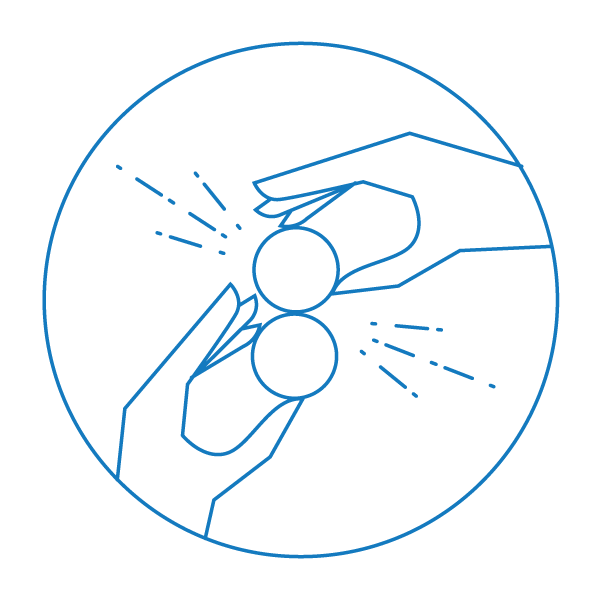
What drives your passion for teaching young people about local food?
When I was a teenager, I started learning about all the problems we have in the world, and I wasn’t very happy about it. I kept asking myself, “Why? The world is such a mess, and I don’t see any adults doing anything about it!” This experience made me who I am. I grew out of being angry when I realized that the only thing I could do was to do something about it. I wasn’t going to change the world by complaining or being mad with everyone else for not acting on it. I was going to act on it myself and that’s it. I was going to become the change I wanted to see in the world—as cliche as that is, it remains true and wise. I believe that is the only way to make things better.
That’s how I started cooking. I moved from Colombia to the US with no money, when I was 16 years old. I didn’t speak any English at all, and at times I even slept in my car while I figured out how I was going to proceed with my life. One day, I went to the back door of a restaurant kitchen, knocked, and said, “Hey Chef, I’ll be your best employee. I will work harder than anybody else. I don’t have any experience. But I promise you that you’ll never have any problems with me.” Of course he said, “You are hired.” And so I started moving my way up in the kitchen through having a good attitude and being willing to do whatever it took to reach the next level.
I’m not rich now by any means—not financially anyways—but I consider myself to be wealthy beyond belief, because I get to spend time with my family, and my daily life is focused on how creative I can be to solve problems in my community and help everyone live a better life. That is what keeps me going.
When I teach these kids [at the Green Workforce Academy]—I promise you—my favorite thing to do in the whole world is to speak to them because I was angry at that age. I didn’t understand why no adult was doing anything to make the world better. And I want to be the adult who is actively doing something about it now. As small and seemingly insignificant it may be on a world scale, it is hugely powerful because if you can influence one person to spend their life doing good things for our community, the world gets better, and the message ripples and multiplies. That’s all it takes, and it is all we can do.
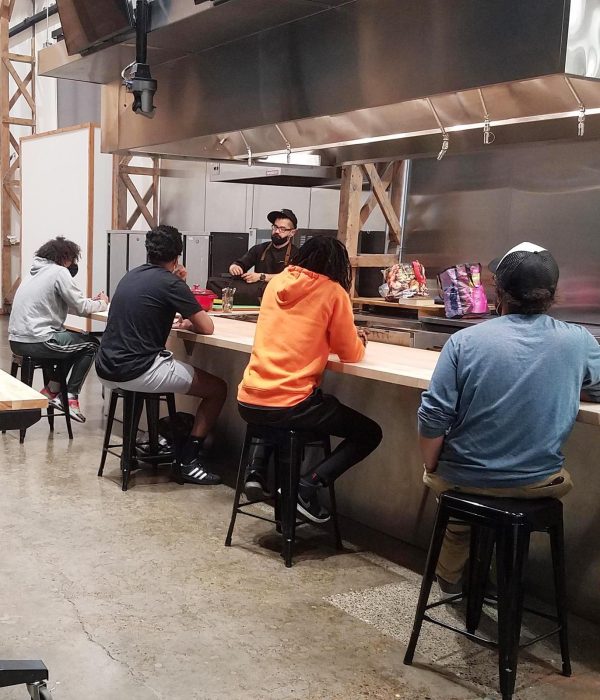
Green Workforce Academy in session with Andre. Photo by Teresa Gaddy
You have been doing a lot about it; you’ve worked on a lot of different projects, like farm to school in Washington state and working with hospitals to help them source local food. What attracts you to the projects that you choose?
I believe that every single choice and action we take has the power to either make the world a better place or a worse one, and I have become obsessed with that.
As a chef, I know that my job is to support local agriculture because they, more than anyone else, make the world a better place by providing us with healthy food and creating the foundation for a resilient local economy. As a father, my job is to make sure my kids always catch me in the act of excellence, because as any parent can tell you, they don’t learn from what you tell them, they learn from what they see you do.
“
Everyone around us should have a better life, because you’re here. That’s the legacy that we’re supposed to create.
And as a member of this community, my job is to help teach others what I have learned. For example: I teach underprivileged kids (like I was) how to empower themselves by having great attitudes, working hard, becoming obsessed with learning, and most importantly, by finding beauty inside of them and bringing it out for us to see. This means that they need to figure out what they love doing and do that. That’s the beauty we all have inside. I teach hospitals and schools how to source and cook local food because this promotes health and sustainability in our food system at a larger scale. And I am now learning how to film so that I can tell stories of the beautiful things in the world and teach how to eat better through my YouTube channel.
And lastly, as a business owner, I help families by sourcing the highest quality food, cooking it for them, and bringing it to their home so they can be healthy, and they can have the time to do the things that make them happy and they don’t have to worry about the quality and the nutrition of the food they are providing to their families—because we do that for them. We help families live better lives.
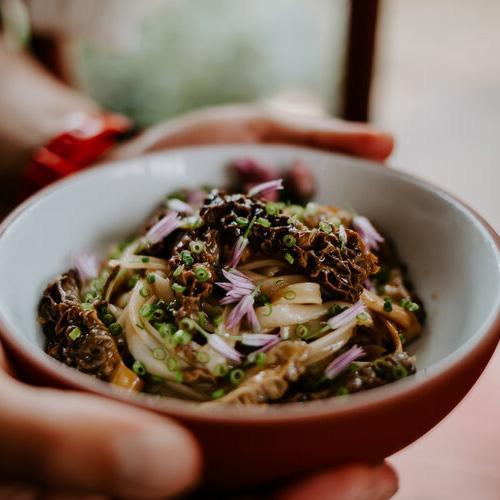
A dish prepared by Sustainable Meals Oregon. Photo credit: Noel Uribe
So your through-line is living your values, right? That’s what drives you. I’ve seen it firsthand, and I think that’s the reason why your passion is infectious, right?
Yeah, because otherwise, what is the point? Why are we on this planet? The answer to me is because you’re here to make things a little bit better. Everyone around us should have a better life, because you’re here. That’s the legacy that we’re supposed to create.
We have these problems in our community: We need people to eat better. We need to make sure that the money that we’re spending in our food system stays local. And we have problems with plastics: it’s terrible to eat out of anything made out of plastic and it also is terrible for our planet.
This is why we started Sustainable Meals Oregon, where we create amazing meals that you can trust. Sourced from local farms and ranches, organic, grass fed and sustainably produced ingredients, all packaged in zero-waste containers—because when I decided I was going to create a business, this was the only way I was going to do it. It was a no-brainer to me that this business is here to do good things for our community, and that’s the only motivation behind it.
You saw a three-tiered problem, and with Sustainable Meals Oregon you solved for all those things. But solving those problems increases your upfront cost. How do we address that on a larger scale?
I’ve thought about this a lot. Sustainable Meals Oregon’s way of doing business costs more for us, because for example, if I was to package in plastic, it would be way cheaper, and it would save me tons of labor. But I would never do that, because my entire life has been about doing the right thing. Right now, it is just Chef Patrick Marg and me doing all the work, and we both agree that we will never change the way we do it, because it would defeat the whole point. We would lose all respect for ourselves and each other, so we keep each other accountable. And as friends, we push each other to be better.
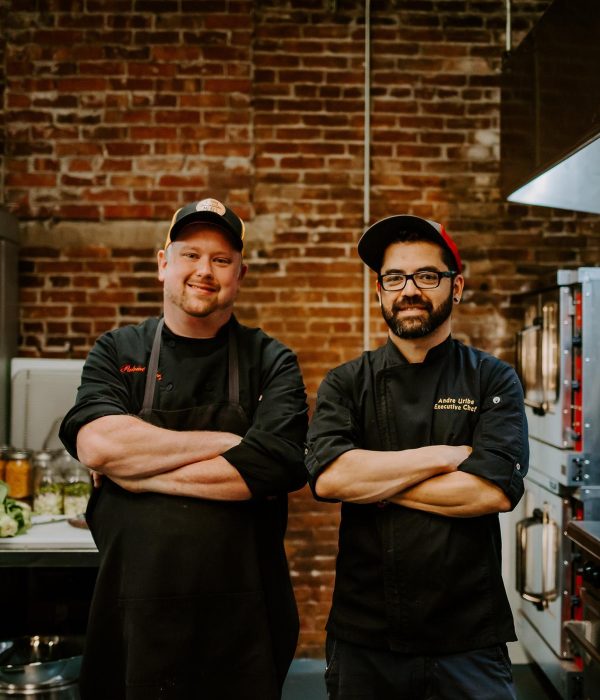
Patricio and Andre of Sustainable Meals Oregon. Photo credit: Noel Uribe
Also, to further drive my point, we are buying whole pigs from Redbird Acres, and I’m supporting people who do amazing work. It’s obviously more expensive than if I bought pork from a factory farm (the most evil industry ever). But Redbird Acres is changing the world, drastically, for the better. They’re providing our community with healthy animals, and they’re taking care of their soil—their job is incredibly hard, and they do it because they want to make a difference. Their whole operation is amazing. And I have to do my part to make sure they can continue to do that.
Everyone benefits from Sustainable Meals: [like the farmers benefit, the customers benefit], and as a bonus, I get to use my time to teach everyone how to take steps towards better food, better health and better communities. We are not able to feed every person local food, but I am able to teach them how to source it and how to eat like royalty on a budget, which you can do if you know how.
I believe in the idea of replication, so I want to grow Sustainable Meals to the point where my friend and I, and maybe one more person, can handle it. After that, I’ll tell everybody how I did it, so somebody else can come and steal my idea. I don’t need a million dollars, you know what I mean? I just need enough, so my family is good and my business is sustainable.
I’m curious, in the early days of your career when you were working in corporate kitchens, what was happening in terms of buying direct from farms and supporting local producers?
[When I was cooking in a corporate kitchen], we were spending $5,000 to $10,000 a day on veggies—in the middle of summer. So I thought, “Why are we not giving that money to the 200 farms that are around here, instead of giving it to huge companies that are bringing in veggies from other parts of the world?” This made no sense to me.
“
All the relationships that I started making with these farmers—it was connecting on a human level.
So I reached out to the local farms, and in the process I met some incredible people like this retired couple—the most amazing, beautiful people you’ll ever meet in your life. They grew only potatoes at first, and they were gonna throw away all the potatoes because they couldn’t sell them all, so I said, “No, no, don’t do that! I’ll buy them all. People love potatoes; we can make french fries and mashed potatoes.” I started buying them weekly, and we went through all the potatoes that they had. I was so happy, because I could help this couple. And there are many more examples just like this one that proved to me that this was the right thing to do.
All the relationships that I started making with these farmers—it was connecting on a human level. You know, these people want to feed our communities healthy food, and I want to make sure that they can do that. It’s like a symbiotic relationship in which we all win.
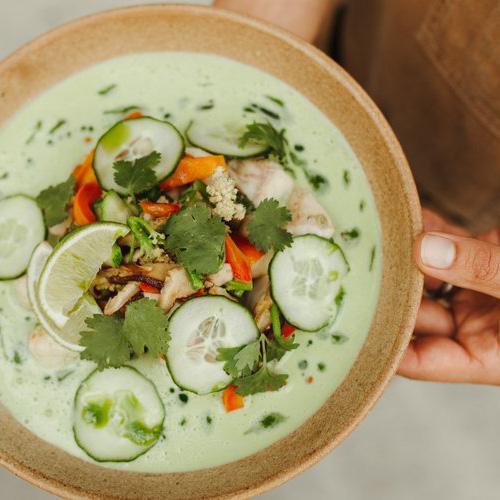
Sustainable Meals Oregon. Photo credit: Noel Uribe
What do you think folks can do to make a difference in their community?
People have way more power than what they think they do. Every choice they make has a lot of power. In my case, this tiny little company that I have has a lot of power, you know, there is a ripple effect of positivity. You add love into something and you get love back.
I think about everything in the long term, because I have two kids. And the world is changing drastically every minute. No one knows what the world is going to be like in ten years. So if we don’t start taking the right actions today, then who knows? But when it’s my time to go, my kids are going to say, “My dad every day did something to make the world better for us. He really tried.”
Thank you, Andre.
Learn more about Sustainable Meals Oregon, and subscribe to Andre’s YouTube channel for more tips on using and sourcing local food.

Website
Sustainable Meals Oregon is here to help you live the best life possible. By creating amazing meals that you can trust.

Video
This channel is about learning that cooking and eating can make the world a better place in a direct and tangible way. One bite at a time.

Project page
A paid opportunity for Black, Native, and people of color in Portland who want to learn more about jobs in the green economy.